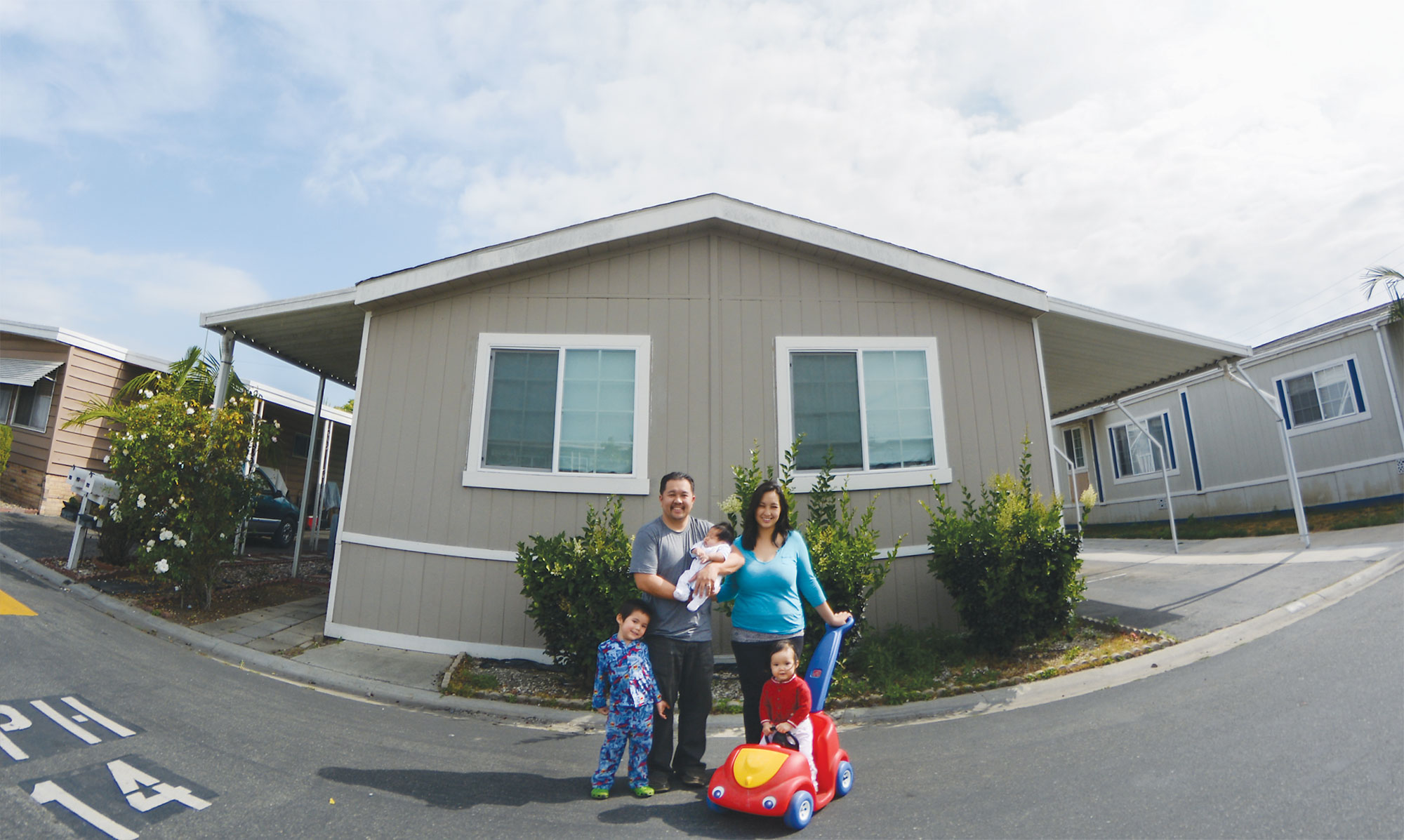
Lee and Haily Nguyen sleep in one room, which they share with their three young children. Their home’s two other bedrooms are available for others who need a place to stay, sometimes housing one person, other times entire families. Many have stayed for less than a week, others needed to stay a few months, and a couple others for two years. Some are former gang members, some are from broken families, and some are relatives. The Nguyen’s call this “family living”.
The Nguyen’s have three kids: Bradley, 4; Amberly, 1; and Conley, 4 months. Haily is a local high school substitute teacher and full-time mother. Lee is the lead pastor of Kaleo Mission Church, a church plant in Garden Grove, California.
This vision for “family living” began after Lee’s younger brother temporarily moved in with him and his then newlywed wife in 2010. The church plant followed a year later.
“That’s pretty normal for families to take care of each other,” Lee said. “But when we started a house church, we started opening our doors for people to live with us.”
The start of something new
Both Lee and Haily come from large families. Haily was accustomed to having a dozen people living with her family, often relatives who had emigrated from Vietnam. Although it wasn’t an unfamiliar idea to live with multiple families in one household, they had never opened their own doors to other families before.
As they processed the reasons for opening their homes, Lee realized that, “God has placed in all our hearts a desire to love. What is the best way to love? And how do we love? One of the ways we love is as a family and so we wanted to treat people like family ... and love people in that way.”
Lee became a Christian through family. When Lee was 19, the Gonzalez family took him and his younger sister in after their family had fallen apart. His mother had abandoned them, taking his three other siblings. Loved by this other family, Lee wondered why they would care for him as their own child. He didn’t find this type of family at school, among friends, or in gangs.
“Through that family I realized God’s love,” Lee said. “That family was showing me God’s love and I was sold. Ever since then, I just saw the church as God’s family. For those that we meet in our community, we want to do the best we can. That’s the heart behind it — to love God and love people.”
The Nguyen’s first experience of family living, or community living, took place in an African American neighborhood — where they wanted to do community in a context where they hadn’t done it before.

In 2010, they moved to Gardena, California’s South Bay, west of Compton. They lived in a 56-unit apartment complex, where most residents were single parent families.
“I had lived in Hispanic communities and Asian communities, but I’d never lived in a black community,” Lee said. “It’s something different and we’d never done family living before. For us, that’s how we started something new together.”
Although the Nguyen’s are willing to cover the costs for their guests, they also need to find space for them and their own growing family. They transitioned from their one-bedroom apartment, to a three-bedroom condo, and have now settled in a three-bedroom mobile home in Garden Grove, where Kaleo currently gathers.
“We understand family living as sharing your needs, being open and honest — but also being able to contribute,” Lee said.
On a case by case basis, the Nguyen’s decide what to do with their children, how they accommodate others with their limited space and finances, and what to do after people move in. Lee related how church members had met their needs when a homeless family lived with them last year. They met this family for the first time just two months prior to their 6-week stay, after their father had walked out and left the family to face eviction without transportation.
“As a community, we come together and say, ‘Okay, what can we do to love this family?’ Right now they need a place to stay for five kids. But then we needed help to watch the five kids because I (already) have two kids. They were going through a lot of emotional trauma and heartbreak because their father left them. So we had two of our church members come over and stay with us, and help watch the five kids. They stayed in our living room and in the (guest) rooms. After that, we got to figure out who’s going to cook. And pretty much, we had a mini VBS and meals every day at our house during that time.”
The family moved out when they received additional support from their own family and social services, but Lee and Kaleo kept up their relationship with the family, and occasionally, were able to bring one of the daughters to church.
People shared what their needs were and church members shared whatever they could give.
“Our home is our base for our family. Our home is also the base for our church.”
Normal life
In 2013, Garden Grove Friends Church (GGFC) provided Kaleo a place to meet on their church campus. Since Kaleo’s move, other church members caught the vision behind the church being a family. Two other family communities emerged, sharing their homes with those who need to stay over, one hosted by a female church leader, and the other hosted by one of the married couples.
“The church campus and church location are where all the families gather,” Lee said. “But we’re doing church the whole week — if GGFC wasn’t there, we’d still be able to meet at our houses.”
About 20 people attend Kaleo, with less than five who are employed. Most of Lee’s support comes from his intern pastor and five team leaders, the major contributors of the church who give their homes, time, and money.
“We teach people about the kingdom of God and understand that truth,” Lee said. “In the area of generosity, we understand how rich we are, being sons and daughters of the King. That begins to break that spirit of poverty and the mindset that, ‘I have nothing to give.’ When we come from a position of ‘not in need,’ we come from a position of ‘Man, we’re actually filled with Christ, we have Christ, and Christ is sufficient.’ It compels our body, and whoever comes in, to give.”
But for those who are unable to lend their bedrooms for someone else, or devote more time to ministry needs, Lee suggests two practical ways of giving: first, change the way we think, and second, translate how we give into our community.
Life at home “extends” into our workplaces, our classrooms, our people groups. Lee identifies a different way of thinking, from “This is how much time I can give to church, to my work” to “I want to give all my time to God. How am I going to give my time to God through work? How am I going to give my time to God through church?”
How does serving in church affect our home life? Our families? Our coworkers? Is our attitude the same about God’s work in fellowship as it is outside of church settings?
“There should be no distinction between ministry and work,” Lee said. “When I go to work, I see my work as my ministry. And that’s all integrated together.”
When a relative or someone from church becomes sick, the first priority is often praying for them. But when someone at work, in class, or in a restaurant is sick, Lee offers the same challenge to ask them, “Can we pray for you?”
“And we just let God do the rest, through families, through relationships, through conversations — all of a sudden, people from the kitchen are coming out to be prayed for.”
Not all of the people who have stayed with the Nguyen’s were Christians at first, nor are they required or preferred to be. Lee and Haily “simply pray and ask God for guidance on how to love them.”
Lee and Haily’s children eventually warm up to their housemates by name, but are initially cautious when interacting with adults. Yet they are more used to being around adults than children because of the countless number that had stayed with them for less than a week. While most of the housemates had not contributed to the household financially, they are “expected” to help the community and family in some way, caring for the needs of the house. They give their time through acts of service. Some who gained Lee and Haily’s trust were also given the responsibility of helping to raise the Nguyen children.
“Once that mindset is changed, then we can come to God, pray in our community, and pray for each other,” Lee said. “But that translates to: we do the same thing at work or wherever we go. We make things very intentional about translating what we do in our community and our church. This can be done every day. It’s just a normal life.”
Perspective
“How would you define the term ‘radical’?” Lee asks. “If radical means obeying Jesus, I wouldn’t call that too radical. I would just call that obedience and Christian life.
“I guess it depends how you explain ‘radical’. If it’s radical for our own lifestyles or American priorities, I guess you could say ‘radical’. But compared to Christ, I would consider this pretty normal and actually basic Christianity.”
Often times Lee encounters the evangelistic apathetic church, an inwardly focused church, or a program-driven church, where the “radical” thinking has evolved into, “I don’t want to serve this kind of community,” “I don’t feel like I can give,” or “What can I get out of my church?”
“It’s hard when you hear that coming from all these other different churches or close friends ... but you’re also hearing it from your own family,” Lee said. “This idea that ‘You need to take care of yourself first.’ It definitely comes down to trusting that God takes care of us and that we need to love each other as we love ourselves ... remembering how much God already loves us.
“The church is the whole family. What does family do? Family lives together. Family is there for each other."

Lee Nguyen became a Christian in college and has been falling more in love with Jesus ever since. He loves reading the gospels again and again, because Jesus is amazing! Other than Jesus, he enjoys being with his family, playing basketball, and hanging out with friends. Lee is the lead pastor of Kaleo Mission Church, a church plant in Garden Grove, CA.

Jack Yu is a business major at the University of California, Irvine. His creative spirit drives his passion for photography and blogging. You can check out his work at jackyuphotography.com.
